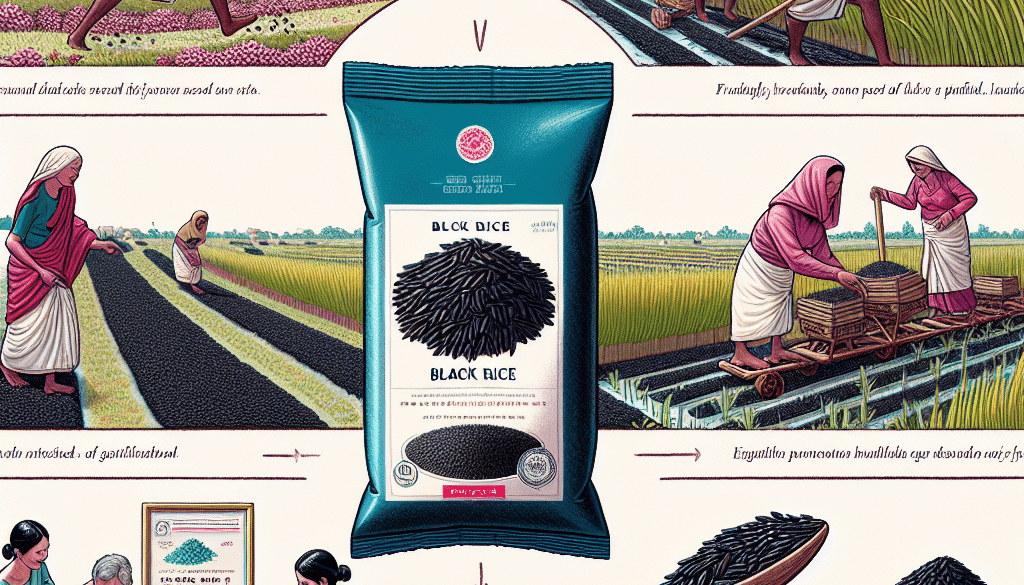Why is black rice so expensive?
-
Table of Contents
- Black Rice: Unraveling the Mystery Behind Its High Cost
- The Rarity of Black Rice
- Cultivation and Harvesting Challenges
- Nutritional Value and Health Benefits
- Market Demand and Consumer Trends
- Cultural and Historical Significance
- Conclusion: The Price of Exclusivity
- Discover ETprotein’s Premium Protein Products
Black Rice: Unraveling the Mystery Behind Its High Cost

Black rice, often referred to as ‘forbidden rice’ or ’emperor’s rice’, is a rare and ancient grain that has been captivating the palates and curiosity of food enthusiasts around the world. Its unique color, nutty flavor, and nutritional benefits make it a sought-after commodity in the culinary world. However, its price tag often raises eyebrows, prompting many to wonder why black rice is so expensive. This article delves into the factors contributing to the high cost of black rice, offering insights into its cultivation, nutritional value, and cultural significance.
The Rarity of Black Rice
One of the primary reasons for the high cost of black rice is its rarity. Unlike common white or brown rice varieties, black rice is not widely cultivated. This scarcity is due to several factors:
- Limited Growing Regions: Black rice thrives in specific climatic conditions and is traditionally grown in certain Asian countries, such as China, the Philippines, Thailand, and Indonesia.
- Lower Yields: Compared to other rice varieties, black rice plants generally produce fewer grains per hectare, which contributes to its limited availability.
- Historical Significance: Historically, black rice was reserved for royalty and nobility in ancient China, which limited its cultivation and consumption among the general population.
Cultivation and Harvesting Challenges
The cultivation process of black rice is more labor-intensive and challenging than that of other rice varieties. This contributes to its higher cost:
- Manual Labor: Black rice often requires more manual labor for planting and harvesting, as it is typically grown on smaller farms that do not use large-scale mechanized farming techniques.
- Organic Farming Practices: Many black rice farmers employ organic farming methods, which are more costly due to the need for natural fertilizers and pest control measures.
- Harvesting Process: The harvesting process for black rice is delicate and time-consuming, as the grains must be handled carefully to preserve their quality and nutritional value.
Nutritional Value and Health Benefits
Black rice is not only unique in appearance but also in its nutritional profile. It is packed with health benefits that contribute to its high market value:
- Rich in Antioxidants: Black rice contains high levels of anthocyanins, the same type of antioxidants found in blueberries and acai berries.
- Dietary Fiber: It has a higher fiber content than white rice, which aids in digestion and promotes a feeling of fullness.
- Protein Content: Black rice provides a good source of plant-based protein, which is essential for muscle repair and growth.
- Mineral Rich: It is a good source of iron, magnesium, and other essential minerals.
These nutritional benefits make black rice a popular choice among health-conscious consumers, which drives up demand and price.
Market Demand and Consumer Trends
The growing interest in exotic and healthy foods has led to an increase in the demand for black rice. This trend is influenced by several factors:
- Health and Wellness Movement: As people become more health-conscious, they seek out nutrient-dense foods like black rice.
- Culinary Exploration: Chefs and foodies are always on the lookout for unique ingredients to enhance their dishes, and black rice offers a distinctive taste and presentation.
- Gluten-Free Diets: Black rice is naturally gluten-free, making it a desirable option for those with gluten sensitivities or celiac disease.
The combination of increased demand and limited supply naturally results in higher prices for black rice.
Cultural and Historical Significance
The cultural and historical significance of black rice also plays a role in its cost. In ancient China, it was believed to have medicinal properties and was reserved for the emperor and his court. This historical prestige adds to the allure and perceived value of black rice in modern times.
Conclusion: The Price of Exclusivity
In conclusion, the high cost of black rice can be attributed to its rarity, the challenges associated with its cultivation, its superior nutritional value, increasing consumer demand, and its rich cultural heritage. While it may be more expensive than other rice varieties, many consider the cost justified by the unique experience and health benefits it offers.
Discover ETprotein’s Premium Protein Products
If you’re interested in incorporating high-quality protein into your diet, consider exploring ETprotein’s range of products. ETprotein specializes in producing and supplying organic bulk vegan proteins, including Organic rice protein, which shares some of the nutritional benefits of black rice. Their products are non-GMO, allergen-free, and boast a high purity level of L-(+)-Ergothioneine (EGT), making them an excellent choice for various industries and dietary preferences.
About ETprotein:
ETprotein, a reputable protein and L-(+)-Ergothioneine (EGT) Chinese factory manufacturer and supplier, is renowned for producing, stocking, exporting, and delivering the highest quality organic bulk vegan proteins and L-(+)-Ergothioneine. They include Organic rice protein, clear rice protein, pea protein, clear pea protein, watermelon seed protein, pumpkin seed protein, sunflower seed protein, mung bean protein, peanut protein, and L-(+)-Ergothioneine EGT Pharmaceutical grade, L-(+)-Ergothioneine EGT food grade, L-(+)-Ergothioneine EGT cosmetic grade, L-(+)-Ergothioneine EGT reference grade and L-(+)-Ergothioneine EGT standard. Their offerings, characterized by a neutral taste, non-GMO, allergen-free attributes, with L-(+)-Ergothioneine purity over 98%, 99%, cater to a diverse range of industries. They serve nutraceutical, pharmaceutical, cosmeceutical, veterinary, as well as food and beverage finished product distributors, traders, and manufacturers across Europe, USA, Canada, Australia, Thailand, Japan, Korea, Brazil, and Chile, among others.
ETprotein specialization includes exporting and delivering tailor-made protein powder and finished nutritional supplements. Their extensive product range covers sectors like Food and Beverage, Sports Nutrition, Weight Management, Dietary Supplements, Health and Wellness Products, and Infant Formula, ensuring comprehensive solutions to meet all your protein needs.
As a trusted company by leading global food and beverage brands and Fortune 500 companies, ETprotein reinforces China’s reputation in the global arena. For more information or to sample their products, please contact them and email sales(at)ETprotein.com today.














